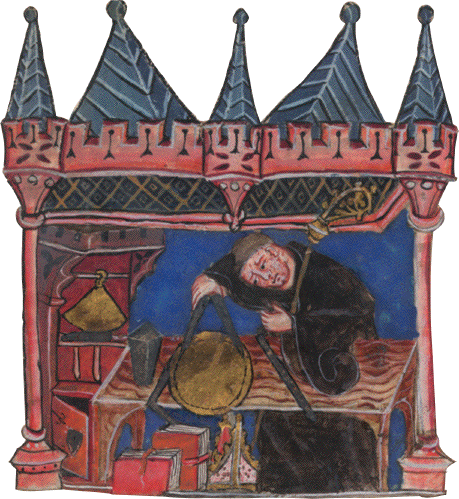I have written about the
Oxford Calculators, four men at Oxford University in the second quarter of the 14th century who made great strides in science and philosophy by treating things like heat and light as if they were quantifiable, even though they did not have ways to measure them. They engaged in "thought experiments" and used mathematics to determine the validity of their points. They were not always right in the end, but they were meticulous in their approach. One of the four was so esteemed that he was called
Doctor Profundus, the "Profound Doctor."
Thomas Bradwardine (c.1290-1349) had a reputation as a precocious student at Balliol College. We know he was there by 1321, and later took a doctor of divinity degree. A gifted scholar and theologian, he wrote theories on the Liar Paradox and other logical "insolubles." The Liar Paradox is the statement "I am a liar." For it to be true, the speaker must be a liar; but if it is a true statement then the speaker is
not lying. Resolving with logic how such statements can be understood had been tackled for centuries. Bradwardine's work
Insolubilia presented complex solutions for puzzles/statements like this.
Like many university men of his day, Bradwardine followed an ecclesiastical career path. After serving as chancellor of the university, he became chancellor of the diocese of London and Dean of St.Paul's. He was also chosen to be chaplain and confessor to Edward III (mentioned in this blog
numerous times), celebrating victory masses after campaigns of the Hundred Years War and being entrusted with diplomatic missions. The only time he did not have Edward's support was when John Stratford, Archbishop of Canterbury, died. Bradwardine was elected archbishop by the canons of Canterbury, but Edward opposed the choice, preferring his own chancellor at the time, John de Ufford. When de Ufford died of the
Black Death (this was in 1349), Edward allowed Bradwardine to assume the position. Bradwardine had to travel to Pope Clement VI in Avignon for confirmation. but on his return, he succumbed to the Black Death on 26 August. He had been archbishop for 40 days.
That career would not have secured his place in history, however, even with his work attacking the
Pelagian heresy. As one of the Oxford Calculators, he developed the "mean speed" theorem and the Law of Falling Bodies before Galileo. He studied "star polygons" (how regular polygons "tile" or fit together in patterns) before Kepler. He developed mnemonic techniques to improve mental abilities, explaining them in
De Memoria Artificiali (On Artificial Memory).
One of his theories involved the vacuum of space. Aristotle felt that a vacuum needed a container, because an open space would automatically become filled by matter outside that space flowing into it. Therefore, according to Aristotle, no vacuum could exist above the world, because there was no container beyond the world to maintain the vacuum. Bradwardine was not satisfied with this. The infinity of space was a hot topic in the Middle Ages and Renaissance. His
De causa Dei (On the Causes of God) argued that God Himself was infinite, and therefore space beyond our world extended infinitely. (This was different from suggesting that God created separately a space that was infinite.) He also suggested that this infinity could include other worlds that God could create and rule over.







